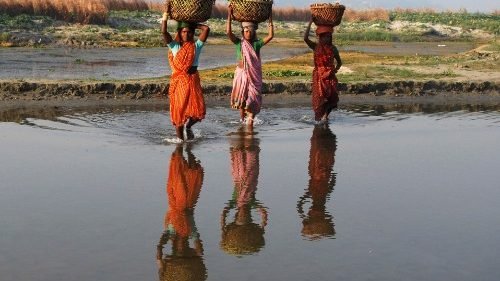Marking World Food Day, Pope Francis says economic leaders must listen to the demands of those at the end of the food chain. And in a post on X he decries military spending and calls for investments to combat hunger.
By Linda Bordoni
Pope Francis chose a two-pronged approach for his message on World Food Day this year, decrying the fact that so much money is spent on weapons and armaments when it could be invested in fighting hunger, and separately calling on global leaders to listen to the demands of those at the end of the food chain.
“War brings out the worst in humanity: selfishness, violence and dishonesty,” he said in a post on X on Wednesday morning to mark World Food Day on 16 October. “Let us reject the line of reasoning that embraces weapons, and instead transform massive military expenditures into investments to combat hunger and the lack of healthcare and education,” he added.
As he usually does on this annual occurrence, he also addressed a message to the Rome-based Food and Agriculture Organization (FAO), appealing to economic leaders at the international level to “listen to the demands of those at the end of the food chain, such as small farmers, and to intermediary social groups, like families, who are directly involved in feeding people.”
In the message, read by Archbishop Chica Arellano, the Holy See’s Permanent Observer at the United Nations Organizations and Bodies for Food and Agriculture, the Pope reflected on the theme chosen for the World Day this year – “Right to foods for a better life and a better future” – and noted that solidarity, justice and a transformation of food systems is needed to ensure that every person has access to nutritious and affordable food.
“This is a priority, as it satisfies one of the basic needs of human beings: to feed oneself in accordance with adequate qualitative and quantitative standards,” he wrote.
Despite this, he added, “We often see this right undermined and unjustly applied, with harmful consequences.”

A smallholder farmer in drought-stricken southern Africa fetches from a pond water for his crop
Listen to the voices of the marginalized
In his message, the Holy Father called for greater attention to the needs of those at the “end of the food chain.”
He stressed the importance of engaging these groups in decision-making processes, particularly when designing food policies and programs, noting that “The real needs from below – those of workers, farmers, the poor, the hungry, and those living in isolated rural areas – must never be overlooked.”
Reminding global leaders that justice and fraternity should guide their efforts, Pope Francis said this call to action is grounded in the Gospel teaching of Jesus Christ: “Whatever you want others to do for you, do the same for them” (Mt 7:12).

Grape farmers in Afghanistan face challenges due to a significan lack of market access
Transformation of food systems
Pope Francis praised FAO’s initiative to transform food systems, urging a shift toward sustainability, inclusivity, and diversity in food production, and he called for a broader vision that not only considers economic and environmental factors but also values the social and cultural dimensions of nourishing oneself.
He emphasized the importance of ensuring that food systems provide “a plurality and variety of nutritious, affordable, healthy, and sustainable foods” to achieve global food security and healthy diets for all.
Integral ecology and human dignity
Pope Francis reiterated the significance of integral ecology and said that addressing the food crisis must be done in harmony with protecting the environment and upholding the dignity of every human being.
“Our planet, which God has given us, should be a garden open to peaceful coexistence,” he wrote adding that taking action against hunger requires an ethical commitment.
“Only by taking the ideal of justice as the guide for our actions can we meet people’s needs,” he said.
The Church’s commitment
Finally, the Pope reaffirmed the Church’s dedication to eradicating hunger and poverty and expressed the Holy See’s support for FAO and other global initiatives aimed at ensuring food for all.
“The Church will continue to contribute tenaciously so that everyone can have adequate food in both quantity and quality,” he concluded, invoking God’s blessing on all those working for this noble cause.

File photo of Archbishop Chica Arellano speaking at FAO



